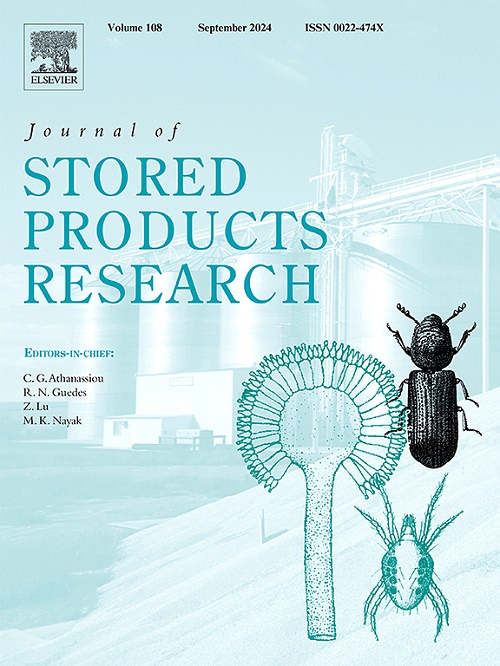了解加纳农民在保持工业用玉米质量方面面临的挑战:障碍和策略
IF 2.7
2区 农林科学
Q1 ENTOMOLOGY
引用次数: 0
摘要
考虑到加纳小农在达到工业标准方面面临的挑战,了解他们如何保持工业用玉米的质量至关重要。本研究探讨了农民对玉米籽粒质量标准的认知,他们在保持玉米产业化质量方面遇到的挑战,他们采用的质量管理策略,以及影响玉米质量的因素。研究结果表明,农民认识到玉米质量的重要性,但对某些质量方面存在误解,特别是对破碎或发霉的谷物。在质量控制措施方面,农民认为这些措施实施起来既困难又昂贵,主要障碍是认证种子、劳动力和储存设施的高成本。农民依靠一系列策略来管理玉米质量,重点是收获前和收获后的活动,如干燥、及时收获、分拣和在通风良好的空间储存。女性农民和受教育程度较高的农民更有可能达到质量标准,而年龄较大的农民由于依赖传统做法而面临更高的拒绝率。影响玉米品质的关键因素包括能否获得现代化的储存设施、质量标准方面的知识和培训,以及年龄、性别和教育的影响。该研究还强调了重大的物流挑战,例如运输基础设施不足和仓库距离长,这些都阻碍了农民保持玉米质量的能力。尽管存在这些限制,农民仍采取预防和纠正措施相结合的方式来提高质量。该研究强调需要有针对性的干预措施,包括具有成本效益的质量控制解决方案、改进现代实践培训以及改善储存和运输基础设施,以帮助农民达到玉米工业标准、提高生产力和改善生计。本文章由计算机程序翻译,如有差异,请以英文原文为准。
Understanding farmers’ challenges in maintaining maize quality for industrial use in Ghana: Barriers and strategies
Understanding how smallholder farmers in Ghana maintain maize quality for industrial use is essential, given the challenges they face in meeting industrial standards. This study explores farmers' perceptions of maize grain quality standards, the challenges they encounter in maintaining quality for industrial use, the strategies they adopt to manage quality, and the factors that influence maize quality. The findings indicate that farmers recognize the importance of maize quality but face misconceptions about certain quality aspects, particularly regarding broken or moldy grains. In terms of quality control measures, farmers perceive them as both difficult and costly to implement, citing high costs for certified seeds, labor, and storage facilities as major barriers. Farmers rely on a range of strategies to manage maize quality, focusing on pre-harvest and post-harvest activities such as drying, timely harvesting, sorting, and storing in well-ventilated spaces. Female farmers and those with higher education levels are more likely to meet quality standards, while older farmers face higher rejection rates due to reliance on traditional practices. Key factors influencing maize quality include access to modern storage facilities, knowledge and training in quality standards, and the influence of age, gender, and education. The study also highlights significant logistical challenges, such as inadequate transportation infrastructure and long distances to warehouses, which hinder farmers' ability to maintain maize quality. Despite these constraints, farmers employ a combination of preventive and corrective measures to enhance quality. The study emphasizes the need for targeted interventions, including cost-effective quality control solutions, improved training on modern practices, and better storage and transportation infrastructure to help farmers meet industrial maize standards, improve their productivity, and enhance their livelihoods.
求助全文
通过发布文献求助,成功后即可免费获取论文全文。
去求助
来源期刊
CiteScore
5.70
自引率
18.50%
发文量
112
审稿时长
45 days
期刊介绍:
The Journal of Stored Products Research provides an international medium for the publication of both reviews and original results from laboratory and field studies on the preservation and safety of stored products, notably food stocks, covering storage-related problems from the producer through the supply chain to the consumer. Stored products are characterised by having relatively low moisture content and include raw and semi-processed foods, animal feedstuffs, and a range of other durable items, including materials such as clothing or museum artefacts.

 求助内容:
求助内容: 应助结果提醒方式:
应助结果提醒方式:


